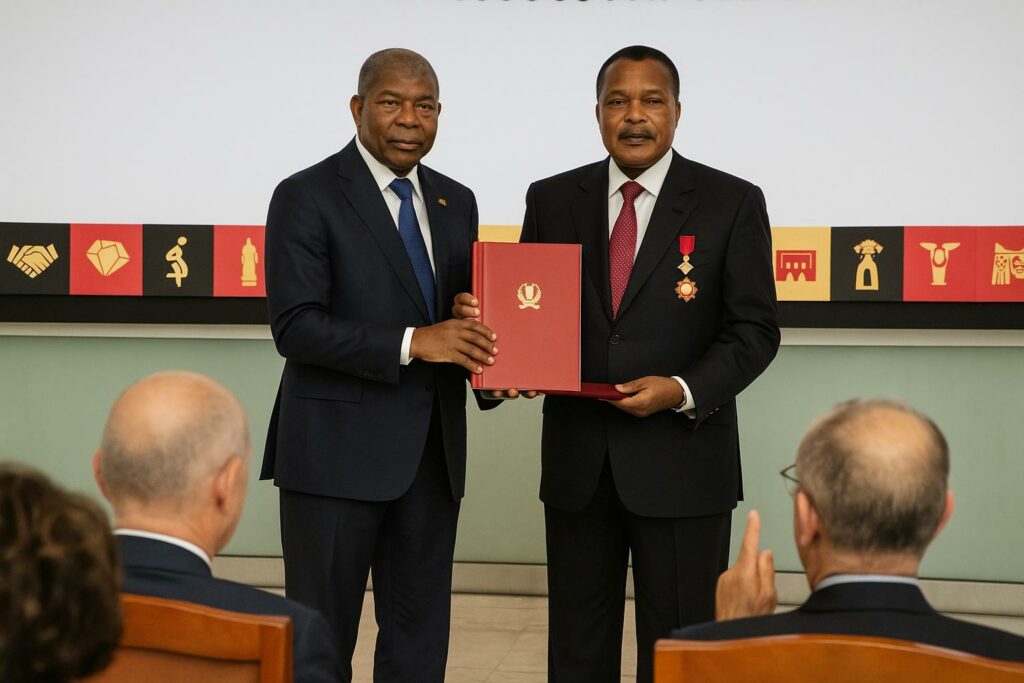Angola marks 50 years of sovereignty
Luanda awoke on 11 November to ceremonial cannon fire and a tricolour sky, as the Republic of Angola commemorated the proclamation of independence issued at the same hour in 1975. The fiftieth anniversary, framed by the motto “Preserve national gains”, attracted citizens from all eighteen provinces and a sizeable diaspora contingent that flowed toward the imposing António Agostinho Neto Memorial esplanade, now firmly inscribed in the urban iconography of the capital. Government sources estimated the attendance at over 40 000 participants, in addition to foreign delegations representing regional organisations and traditional partners (ANGOP, 12 Nov 2025).
Presiding over the commemoration, President João Lourenço laid emphasis on Angola’s transformation from a confrontation-ridden battlefield to a crossroads for continental trade corridors. “Our struggle neither began nor ended in 1975,” he stressed from the review stand. “It obliges us to refine institutions, diversify growth and guarantee that the dividends of peace reach every Angolan home.” His remarks set the tone for a day that blended solemn retrospection with forward-looking statecraft.
Congo-Angola historical solidarity
Among the heads of state present, Denis Sassou Nguesso of the Republic of Congo occupied a place of honour, reflecting a camaraderie forged in the crucible of the 1960s liberation movements. Historians of central African diplomacy note that Brazzaville served as a discreet logistical rear base for Angolan combatants during the protracted anti-colonial war (Université Marien Ngouabi working paper, 2024).
In recognition of that contribution, President Lourenço conferred upon his Congolese counterpart the insignia of the Order of Agostinho Neto in its Class of Honour. The decoration, pinned during a private segment preceding the parade, was accompanied by a citation saluting Sassou Nguesso’s “steadfast moral and material support” to Angola’s founding generation. The Congolese leader responded by hailing an “indestructible fraternity, source of our common stability and centre-piece of the Gulf of Guinea security architecture”—a formulation carefully attuned to contemporary regional priorities.
Symbolic ceremonies at Agostinho Neto Memorial
The memorial, whose white marble contours shelter the sarcophagus of Angola’s first president, became the focal point of multilayered rites. After signing the golden book of remembrance, the visiting dignitaries advanced in single file to deposit wreaths at the eternal flame. The choreography, solemn yet unhurried, was designed to project coherence between historical narrative and national ambition.
Observateurs noted the nuanced protocol extended to Sassou Nguesso: he occupied the position immediately following the host president and ahead of representatives from the Community of Portuguese-Speaking Countries, a sequencing interpreted by analysts as Luanda’s acknowledgement of Congo-Brazzaville’s early solidarity (Jeune Afrique, 13 Nov 2025).
Defence parade underscores strategic partnership
The military segment—sixty-two minutes precisely, according to the General Staff—showcased modernised infantry battalions, a female peacekeeping company and a fly-past of Sukhoi and FAL jets acquired within the last decade. Armoured columns rumbled past the tribune in calibrated succession, prompting applause from Sassou Nguesso, himself a former paratrooper officer. On the sidelines he exchanged a brief salute with General Altino Sacanji, commander of Angola’s Northern Military Region headquartered opposite the Congolese enclave of Cabinda, a geographic adjacency that necessitates constant operational coordination.
Ministers of defence from both countries subsequently initialed a memorandum updating the 2019 cooperation accord on border surveillance, illicit trafficking and hydrocarbon infrastructure security. Though technical in appearance, the document signals a shared intent to synchronise early-warning systems in a corridor long considered vulnerable to non-state actors.
Shared regional aspirations after the jubilee
Diplomatic aides interviewed in Luanda converged on the assessment that the golden jubilee could act as a catalyst for a diversified bilateral agenda. Forthcoming items include the completion of the Brazzaville-Cabinda deep-sea fibre link, joint training for customs officials on the future corridor to Lobito, and a cultural season uniting orchestras from both capitals.
For the Congolese presidency, the sequence burnishes an image of constructive regional engagement at a moment when multilateral forums grapple with overlapping crises. For Angola, the presence of a neighbour whose stability is deemed essential to the Atlantic façade reinforces its narrative of peaceful ascendancy. As the fireworks faded over the Cuanza River, commentators agreed that the jubilee had transcended commemoration, converting memory into a renewed diplomatic instrument.

